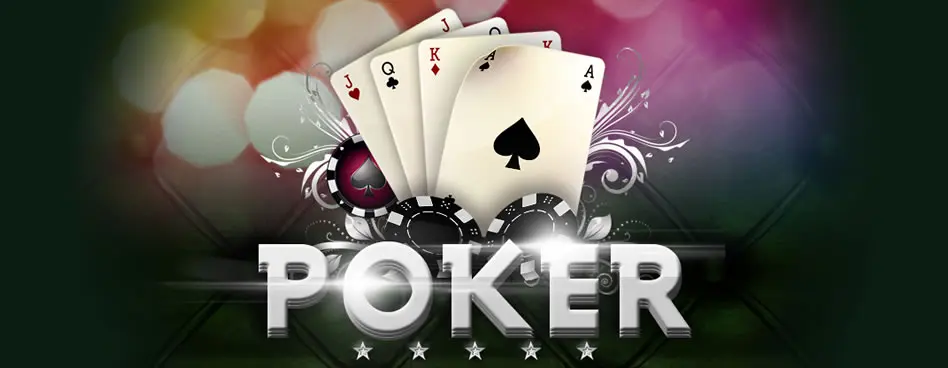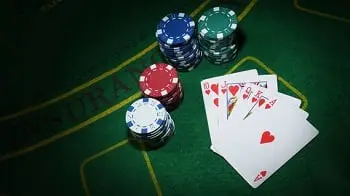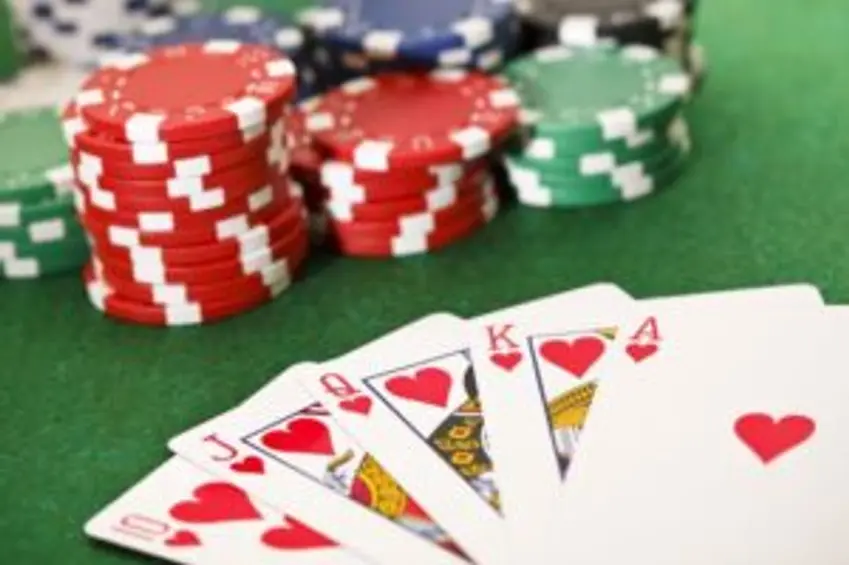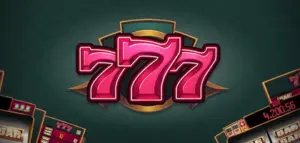Poker Strategy and Tips
Empowering Gamblers with Knowledge and Strategy
Top casinos related to this game

Playing to Win - Strategic Guide to Texas Hold’em Poker
 Poker is a game that combines the ability to draw conclusions based on hard facts with a good psychological awareness of one's self and of one’s opponents. To begin a game of Texas Hold’em, players are dealt two cards and try to defeat opponents by creating the strongest hand. To do so, they tap into a pool of shared or community cards that are combined with their own cards.
Poker is a game that combines the ability to draw conclusions based on hard facts with a good psychological awareness of one's self and of one’s opponents. To begin a game of Texas Hold’em, players are dealt two cards and try to defeat opponents by creating the strongest hand. To do so, they tap into a pool of shared or community cards that are combined with their own cards.
While gambling games have existed for many years, poker truly picked up momentum in the United States during the early 20th century. In the 1990s, Texas Hold’em became the most competitive and popular version of poker and since that time, it has been the main tournament version both online and offline.
This comprehensive poker strategy guide is designed to help you understand how this simple card game can take years to ultimately master.
Basic Poker Strategy
The beauty of poker is that everyone can start playing immediately. The basic concept of the game can be learned in a matter of minutes, even though mastering it might take years. It’s important to learn good habits from the beginning. Basic poker strategy is subject to popular cultural references and it has been romanticized in movies, TV series, and books. Quite often these references are filled with errors or simplified and the end result is misinformation about this game. There are several things that deserve your full attention when playing poker.
1. Learn Basic Poker Decision-Making
A poker strategy begins with a decision, early into the game, to keep playing after you have seen your hand, or to fold. Put simply, a good poker player will learn whether they should buy their way in and meet the big blind. This is the best that you need to place to participate in a game. There are positions when the big blind is a mandatory bet, but if you are not forced to pay it – because of your position in relation to the dealer, then you can fold right away if you feel your hand isn’t good enough.
With experience, a player can tell when to fold, i.e. pass the round because they believe their starting card isn’t strong enough to lead to a positive outcome. How do you acquire the knowledge necessary to become a confident, autonomous player? The simplest way is through practice and a lot of it! Even the best players recommend that you play poker for the fun and love of the game, and the results will follow.
What’s important at the beginning is to learn which hands aren’t worth playing and that you will probably need to fold straight away.
2. Consider the Odds in Poker
Poker is a game of mathematical probability yet some of the metrics remain unknown. This divides the game into both a theoretical exercise as well as a fact-based one. For this precise reason, you need to consider all possible outcomes.
This is the knowledge that comes to you over time, as a result of a conscious effort to be analytical and observant. While you don’t need to calculate odds in real time when you start, learning how to do so will definitely help you. Many players feel their mathematics is inadequate to cover the ‘difficult calculations necessary in a game of poker’. In fact, math is relatively basic, and all you need to do is practice and play repeatedly. It can be worthwhile to play a few hands of free online poker to master some of the more subtle nuances of the game.
3. Patience and the Long-Term Game
A good poker strategy teaches that patience is a virtue, and there is a good reason for this. When you have had a few bad hands, and your pot has been whittled down to a small pile of chips, it’s understandable that most players begin to doubt their decision-making process. Well-seasoned players almost always say to wait for the right hand, or you would just be committing more money than the blind. In addition, "bad beats" can happen and when they do, just take them in your stride.
4. The Psychological Factor in Poker
Poker is about reading your opponent. Of course, simply telling a person that ‘they have a tell,’ wouldn’t really work. Your ability to read an opponent is crucial in live poker games, although not as important in online Texas Hold’em games. Yet, the psychological factor of the game is a big influencer of the final outcome, and the better a virtual ‘poker face,’ you have, the better your chances of winning.
Poker Hands – Reading the Cards
Let's talk about poker hands, and specifically how these hands rank. As stated earlier, the objective is to create the strongest hand and secure the pot that is being wagered every round. Here’s the ranking of all hands starting with the strongest:
 Royal Flush – You have heard about it. It’s the best possible scenario and guarantees a win. You will need Ace (A), King (K), Queen (Q), Jack (J), and a 10 of the same suit to secure one.
Royal Flush – You have heard about it. It’s the best possible scenario and guarantees a win. You will need Ace (A), King (K), Queen (Q), Jack (J), and a 10 of the same suit to secure one.
Straight Flush – The second-strongest hand is the Straight Flush where you have five consecutive cards of the same suit. An example would be J – 10 – 9 – 8 – 7. If your opponent has a Straight Flush as well, the higher-value hand wins.
Four-of-a-Kind – As the name suggests, you will be hoping for a 10 – 10 – 10 – 10 or any combination of the same cards from different suits.
Full House – A full house is a combination of 3 of a kind and an accompanying pair. In other words, you have a full house if you land Q – Q – Q and 6 – 6, for example. Any combination will do so long as this condition is met.
Flush – A Flush is an opportunity for players to leverage the power of suits. You need five cards of the same suit to get a flush, without the need for a numeric order. In other words, spades of Q – 10 – 6 – 5 – 2 is a flush.
Straight – The straight is five cards in consecutive numeric value, but not all of the same suit.
Three of a Kind – As the name suggests, you need three cards, as in K – K – K of different suits to create this hand.
Two Pairs – Two pairs of the same value, as in 9 – 9 and Q – Q, for example.
One Pair – One pair is a combination of two same-value cards of different suits, as in 7 – 7.
High Card – When none of the above occur in a round, the player with the highest card wins. This is one of the least likely outcomes in Texas Hold’em.
As you can see the hand rankings in poker are very intuitive and make common sense. You should learn and be able to recognize each hand and its value. Any Texas Hold’em Poker strategy will advise the same thing – start playing and have the ranking of hands firm in your memory. Before you know it, reading poker hands will be second nature.
Poker Rules
You are already familiar with poker – up to a point. Poker hand ranking is no issue and you are happy to put this knowledge into action. The rules of actual play are simple enough. In Texas Hold’em, there are two mandatory bets – the Small Blind and Big Blind.
The Big Blind is usually double the value of the Small Blind (known as "under the gun"), and the Small Blind is the player to the left of the dealer. The Big Blind sits next to the small blind – i.e. the second seat from the dealer. The game itself is separated into several stages:
- Pre-flop – When the blinds are collected and hole cards dealt to players
- Flop – Three community/shared cards are turned face up on the table
- Turn – After bets and decisions are made, a fourth community card is placed
- River – A fifth community card is produced and the remaining players complete a betting round
- Showdown – Final betting is done and cards are displayed to determine the winner of the round
Once the showdown is complete, a new round starts. A game continues until only one player is left standing or the remaining players agree to strike a deal and divide the prize pool. In tournaments, the big blinds will increase every X number of minutes, so keep this in mind.
What’s a betting round? A betting round in poker begins with the small and big blinds, and then players choose to call, raise, or fold. If someone raises, players who want to continue playing must raise as well. You can only check if there has been no raising and all bets are matched.
Speaking of the rules of the game, there is a specific rule called ANTE, and that is a very common occurrence in tournaments and sometimes in cash games. The ante is an extra bet that is collected from all participants before the flop.
This is done to encourage players to be more daring in the first stage when they have to decide whether they will pay the big blind bet or just withdraw from the game – called 'a fold'. The antes are most common during tournaments.
Poker Variants: Omaha & Limits
Texas Hold’em is the poker format we have discussed so far. It’s rather conservative insofar that the pace of the gameplay is concerned. However, there is another version of the game known as Omaha – and it’s quite popular as well.
Unlike Texas Hold’em, in Omaha players receive four-hole cards to themselves in the pre-flop stage, giving the entire game a far more aggressive overall pace. Players seldom fold in the pre-flop, which is very common in Texas Hold’em.
What about fixed/pot limit and no limit? Pot and fixed limits usually mean that you cannot exceed a specific betting limit. However, at no limit, you can bet all your chips if you want when your turn arrives.
Texas Hold’em is considered the most popular game because it offers more time to create strategies, but there are very strong Omaha players out there, with the format growing in terms of popularity.
Poker Terminology
Poker nomenclature is quite popular even outside the game and you must have heard ‘all in’ on at least one occasion. Here are a few terms that you should become familiar with:

- All–in–A bet whereby the player commits his or her entire pot of chips. This bet can be made to meet an opponent’s larger bet, especially when a player doesn’t have enough chips left to bet against it.
- Small blind – The first bet made by the player to the left of the dealer.
- Big blind – The player second to the left of the dealer who generally bets twice the amount of the small blind.
- Call – The act of matching the big blind or any former bet so far.
- Check – When a player decides to not raise bets and just waits to see what the players after him or she do.
- Raise – A player’s decision to match the current bet and raise the amount further.
- Fold – The act of throwing one’s cards and withdrawing from the round.
- Cash Game – A common online and offline format also known as ring games. Unlike tournaments, players can sit in and get up wherever they wish.
There are other specific terms that you may hear thrown around a poker table, but they could be restricted to geographical locations. For the most part, the terms listed here are the most common and useful ones.
Poker Odds & Probabilities
As mentioned earlier in this guide, any online poker strategy or real casino poker game pivots around the concept of mathematical probability. Now, this sounds scary but it’s not. There are two main terms we will introduce here:
- Pot odds – Pot odds are the relationship between the size of the current pot to the size necessary for a player to stay in the pot. If, for example, the current pot is $30 and to call you need to spend another $10, then the odds are calculated as 30:10 or 3:1.
Confused? Don’t be, because it really gets easier from here on. Add up 30+10 for 40 and then divide 10 by 40. Congratulations, you have just found out that your pot odds are 25%.
- Odds of winning – Odds of winning are what your chances of having the best hand are. This is where it gets tricky. In theory, knowing that you have a 25% to win means that you could theoretically break even (based on our pot odds example), but you still need to calculate the likelihood yourself, using various metrics such as distinct hands, frequency, and more.
Even then, you must remember that there are quite a few unknowns that can throw a spanner in the works. So, you see – poker is gambling, but if you are playing optimally, the gambling element is reduced and a complex set of trained and taught skills takes over.
Ultimate Poker Tips
Each player has a range of poker tips they have picked up and stuck with. This is a compilation of such tips that have proven invaluable to disciplined poker aspiring professionals:
- Play when you are confident that you have something – Players think that they should ‘try their luck,’ but there is no luck. If you have a good hand and intend to play, make sure you do. Faltering in mid-game would strip you from your ability to bluff efficiently. All hands must be delivered with confidence.
- Don’t call the Big Blind preflop – Don’t encourage players before you have the information you can work with and avoid ‘limping,’ or simply calling the big blind right away.
- Big Blinds should use their advantage – You have already committed and have a whole table of players who are about to make up their minds about what to do next.
- Be aggressive with your strong hands – Don’t let a great hand escape you and make sure you play it optimally so you may build an advantage and amass a chip lead.
- If in doubt, fold – It takes a big player to fold when they aren’t sure. Many give in to temptation and play on a hunch, but all poker pros agree that when you aren’t entirely convinced in the strength of your hand, folding is the best policy.
- Find the tables where you can dominate – There is no shame in seeking out cash games where you are the more experienced player. The only way to amass money from grinding is to focus on somewhat less experienced opponents before you break into the higher echelons of poker.
- Don’t force yourself to play – While you must be persistent in your play, you shouldn’t force yourself. It’s a good idea to practice daily and learn new things, but you also must do it with a fresh mind and not after a tiring day.
- Enter poker tournaments online – One of the best ways to get a feeling of what a tournament looks like is to find one online. Remember that online tournaments are usually more accommodating – play your best and don’t worry about making it until the end, just focus on the game in front of you.
Of course, there is more practical advice you can use to make sure that you are on the right track. Perhaps, most importantly of all, you should always have a reason for what you do. Operating blindly will cost you money.
Another thing to consider is to let go of strong hands that might not be winning hands. Even A – A may prove to be a misleading hand, especially if it’s all you have. Great players know when to let go of a seemingly strong hand.
And last, but hardly least, you should remind yourself – poker can be quite brutal and you may often find yourself in a situation where cards simply aren’t coming your way. Professional players have learned to take this in a stride, so should you.
Poker Strategy and Tips
A great poker strategy consists of combining hard skills with deductive reasoning. In other words, there is quite a bit of theory you can pick – and continue to pick as you play throughout the years. However, the psychological factor whereby you decide when to play and when to fold is also a major part of the game. To an outsider, poker may appear a matter of chance, but poker players who have systematically won millions out of the game know better.





















